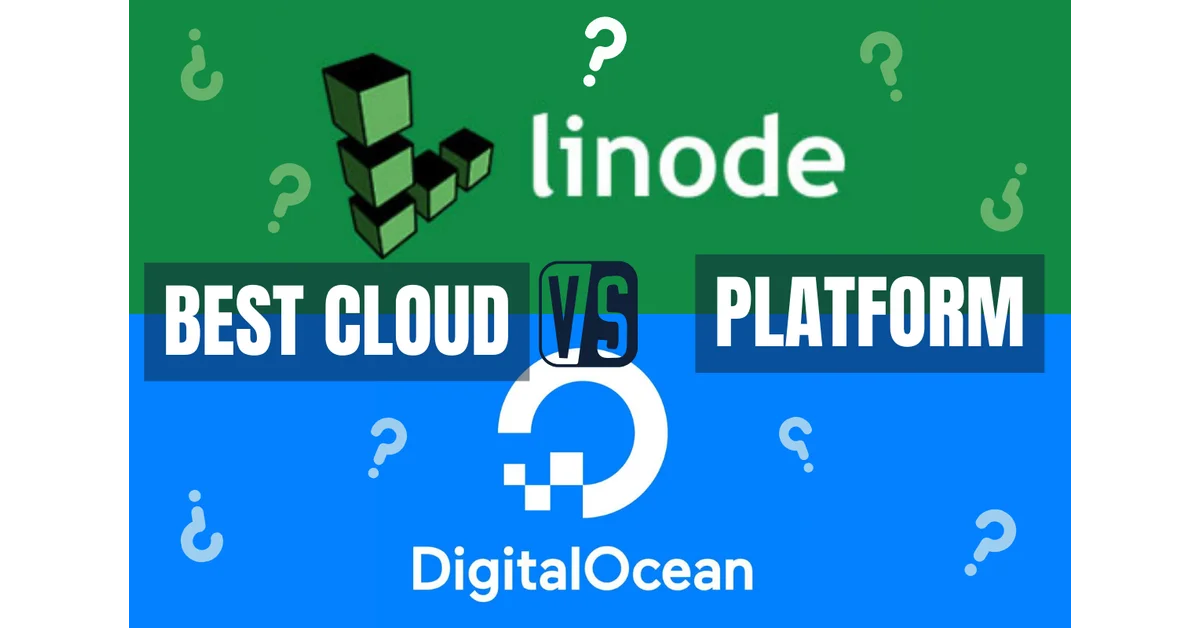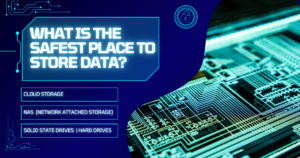Introduction
DigitalOcean vs Linode are two popular cloud hosting platforms known for their reliability and robust features. Both platforms offer a wide range of services designed to meet the diverse needs of developers, businesses, and organizations that seek scalable and efficient cloud solutions.
In this comparison guide, we’ll delve into the key features and offer of DigitalOcean and Linode to help you make an informed decision about which platform is best for you.
Key takeways – My opinion on Linode vs DigitalOcean
If you want something easy to use with good help guides, go for DigitalOcean. It’s great for small to medium businesses. But if you need more advanced options and flexibility, choose Linode. Both are reliable and have good support, so pick the one that fits your needs best.
Table of Contents
Pricing
Understanding the pricing structure is essential to compare DigitalOcean vs Linode. It helps you make an informed decision about which cloud hosting provider best fits your budget and requirements. You don’t want to have surprises in terms of budget, right?
Now, let’s look at the prices to compare Linode vs DigitalOcean.
Base Plans
DigitalOcean and Linode provide competitive options for their base plans. DigitalOcean provides straightforward pricing with fixed monthly rates starting as low as $5 per month for their basic droplet, offering 1 CPU, 1GB RAM, and 25GB SSD storage.
On the other hand, Linode’s entry-level plan starts at $5 per month as well, but it offers a slightly different configuration with 1 CPU, 1GB RAM, and 25GB SSD storage. Additionally, both DigitalOcean vs Linode offer a free cloud estimator to calculate the price of your storage needs, and comparing it with their competitors.
However, while both providers offer similar resources at the same price point, you may want to consider other important factors, such as data center locations and additional features to make your decision.
Here’s Linode’s Calculator with 1 CPU, 1GB RAM, 25GB of storage and 1 TB for transfer:
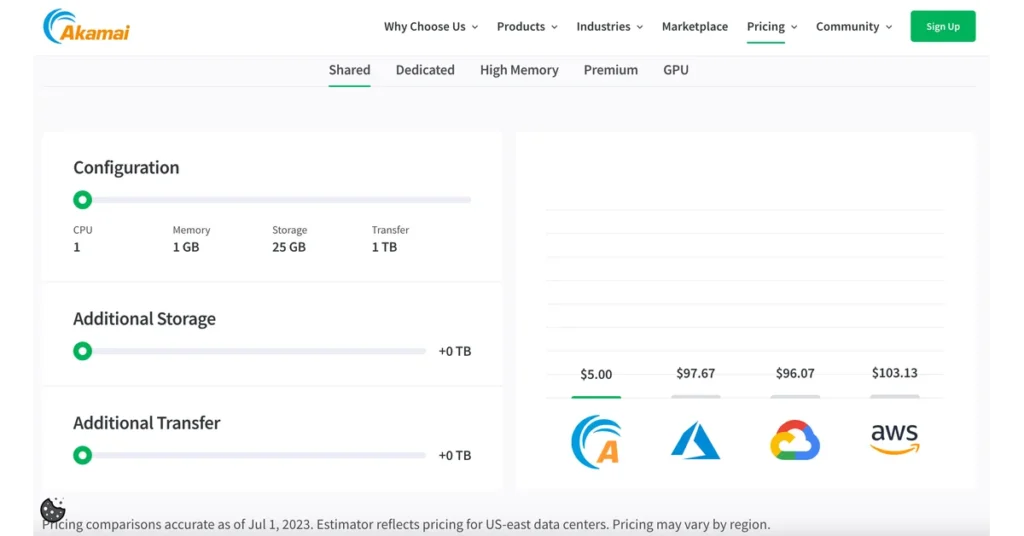
This is DigitalOcean pricing:
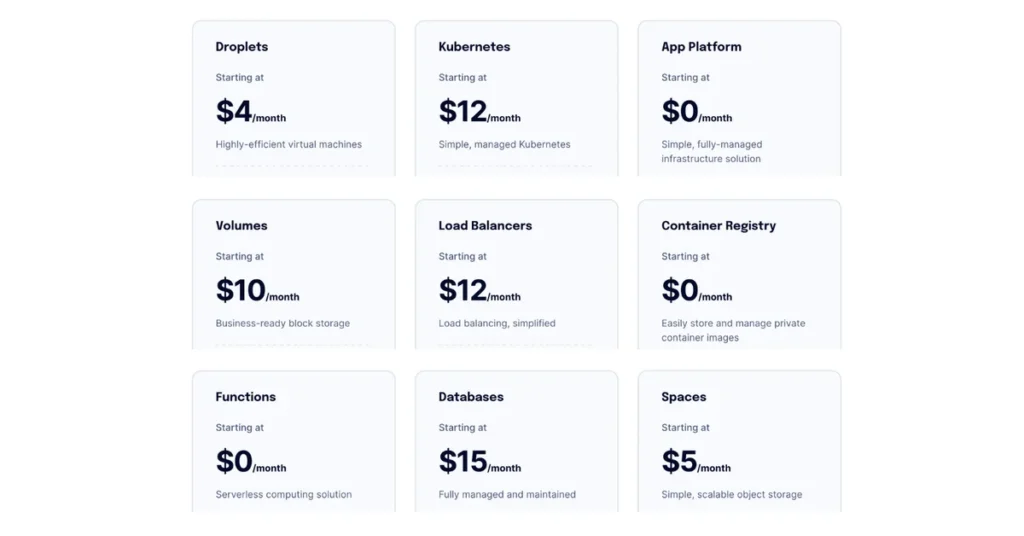
Additional Features
If you analyze additional features, DigitalOcean and Linode offer similar functionalities to enhance your cloud hosting experience.
DigitalOcean provides features like block storage, load balancers, and managed databases, allowing you to easily scale your infrastructure as your business grows.
Similarly, Linode offers block storage, object storage, and a wide range of one-click apps to simplify deployment.
Both providers strive to give you the tools you need to customize and optimize your cloud environment according to your specific needs.
Discounts and Promotions
DigitalOcean and Linode occasionally run promotions and offer discounts to attract new customers and reward the existing ones.
DigitalOcean, for example, often provides credits for new users that try out their services, while Linode offers occasional discounts on their base plans or additional services. In my experience, keep an eye out for these promotions to save money and get the most value out of your cloud hosting investment. I have saved a good amount of money with this kind of coupons and codes.
Best Performer: Linode provides a built-in cost calculator and various features like block storage, while DigitalOcean offers managed databases, load balancers, and managed Kubernetes. However, DigitalOcean may offer a slightly better price deal when we add its promotional offers.
Performance
When it comes to cloud hosting, performance is everything. Your infrastructure needs to be quick, dependable, and responsive when you’re operating an online service, application, or website.
We’ll compare DigitalOcean vs. Linode in terms of performance to see how they compare.

CPU, RAM, and SSD Storage
When comparing CPU, RAM, and SSD storage, both DigitalOcean vs Linode provide strong resources to power your cloud infrastructure.
DigitalOcean provides flexible plans with varying CPU and RAM configurations, which allows you to scale resources according to your needs. Similarly, Linode offers a range of plans with customizable CPU, RAM, and SSD storage options to accommodate different workloads. Both providers have the performance capabilities to match your needs, regardless of the size of your application or website.
Benchmark Results
Benchmark Tests are essential performance indicators in the cloud hosting industry.
DigitalOcean and Linode routinely deliver strong results in terms of speed, dependability, and overall performance, though particular benchmark tests probably differ. Both providers exhibit remarkable uptime and quick response times, as evidenced by independent testing and user reviews. For dependable application performance, you can rely on DigitalOcean and Linode regardless of the amount of data being processed or spikes in web traffic.
Linode Benchmark Test in the closest server to my location:
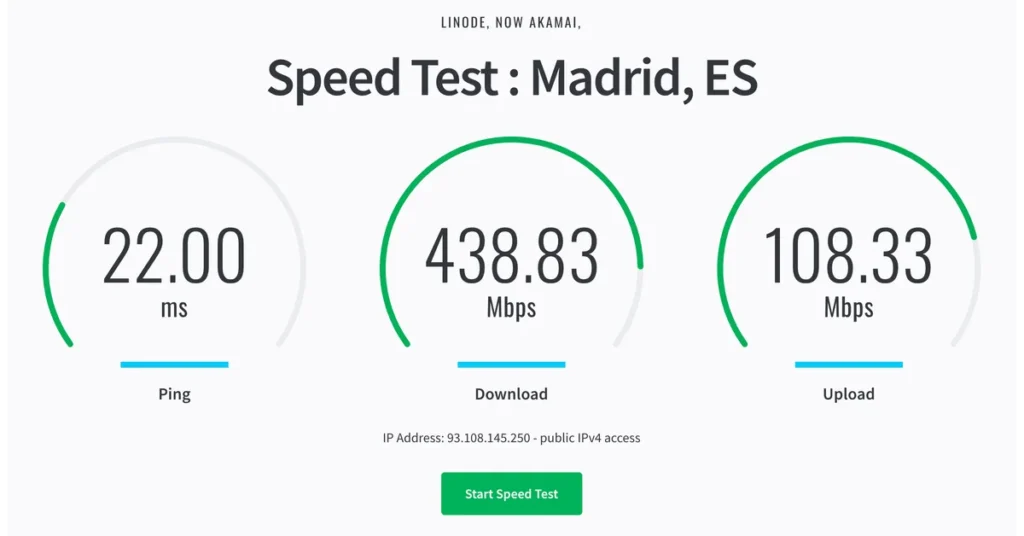
DigitalOcean Benchmark Test with 1 GB in Toronto:
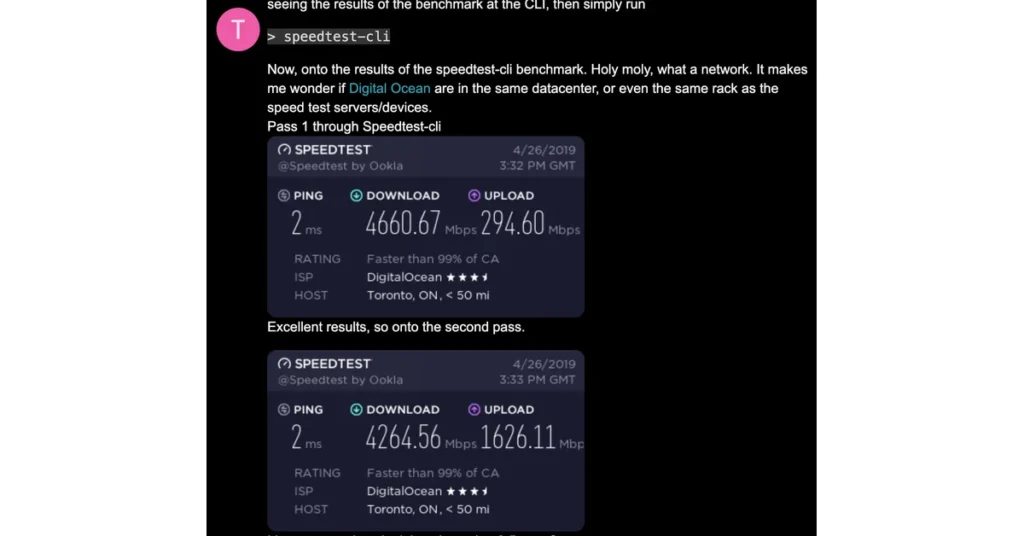
Best Performer: Both DigitalOcean and Linode excel in terms of performance, making it challenging to declare a clear winner. However, based on independent tests and user feedback, DigitalOcean may have a slight edge in certain performance metrics, such as CPU and RAM provisioning speed.
Please remember that benchmark tests vary depending on your computer capacities or location.
Scalability
Scalability is an essential thing to ensure that your infrastructure can grow to accommodate your demands, specially if you deal with a lot of data. With more than 2.3 billion people using cloud storage, you need to find a platform that allows you to expand your cloud infrastructure.
Both, DigitalOcean and Linode are easily scalable, which allows you to have the freedom to change server resources as you need. Vertical scaling makes it simple to increase CPU, RAM, storage and bandwidth in order to manage growth. They also excel at horizontal scalability, offering solutions like load balancers and managed Kubernetes, which allows you to expand apps across multiple servers seamlessly.
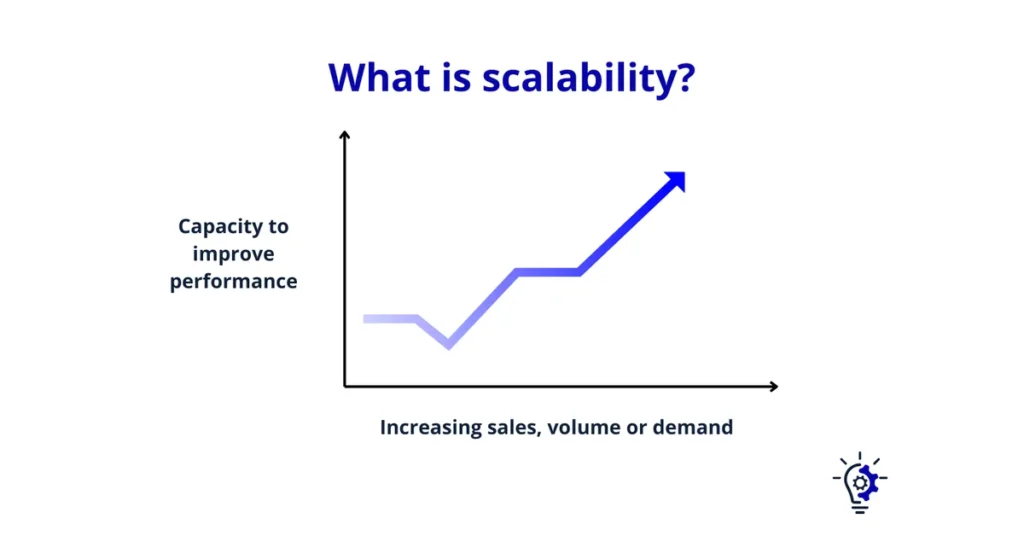
Resource Scaling Options
DigitalOcean and Linode provide similar capabilities for vertical and horizontal scaling. With vertical scaling, you can easily upgrade server resources such as CPU, RAM, and storage to meet growing demands on both platforms.
Additionally, DigitalOcean’s managed Kubernetes service provides a more integrated and streamlined approach to horizontal scaling, offering advanced features for container orchestration and management. That’s why DigitalOcean may be considered the better choice for horizontal scaling solutions.
Data Center Locations
Understanding the location of data centers is crucial when choosing your cloud hosting provider. This aspect directly impacts factors such as latency, availability, and data sovereignty. This is essential to ensure optimal performance and compliance with regulations.
Geographic Coverage
DigitalOcean has data centers across nine regions, including locations like New York City, Amsterdam, San Francisco, Singapore, London, Frankfurt, Toronto, Bangalore, and Sydney. On the other hand, Linode offers a highly distributed platform with over 4,100 edge Points of Presence (PoPs) across 130+ countries worldwide. While DigitalOcean provides a diverse range of regional options, Linode’s extensive global network offers a wide reach and accessibility to users around the globe.
Linode’s Data Center World Map:
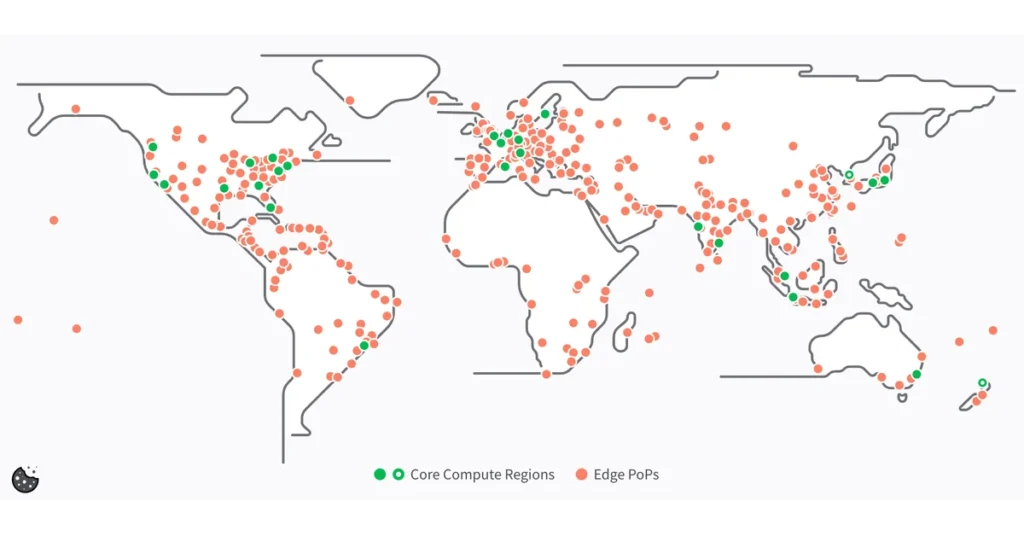
DigitalOcean Data Centers World Distribution:

Impact on Latency and Availability
The geographic distribution of data centers directly influences the latency and availability to access your cloud services.
If you select data center locations that are closer to your target audience, you can minimize latency and enhance the responsiveness of your applications. Additionally, having data centers in different regions ensures high availability and fault tolerance, mitigating the risk of downtime or disruptions. DigitalOcean and Linode prioritize reliability and performance by strategically positioning their data centers and leveraging a distributed network infrastructure that optimizes latency and ensures continuous availability for their users.
Best Performer: In terms of geographic coverage and impact on latency and availability, Linode’s extensive global network offers good reach and accessibility, making it the preferred choice if you are seeking widespread coverage and optimized performance across diverse regions.
User Interface
The user interface of a cloud hosting provider plays a significant role in your overall experience and productivity. A well-designed and intuitive interface can streamline tasks, simplify management, and enhance your overall workflow efficiency.
Control Panel Design
When comparing DigitalOcean vs Linode in terms of control panel design, both providers offer user-friendly interfaces that allow you to manage your cloud infrastructure with ease.
DigitalOcean’s control panel has a clean and minimalist design, with intuitive navigation and straightforward access to essential functions such as creating and managing droplets, configuring networking, and accessing support resources.
Linode’s control panel offers a sleek and modern design, providing a comprehensive set of tools and features for managing your Linode instances, networking, and storage. Both control panels prioritize simplicity and usability, allowing you to perform common tasks quickly and efficiently.
Linode User Interface:
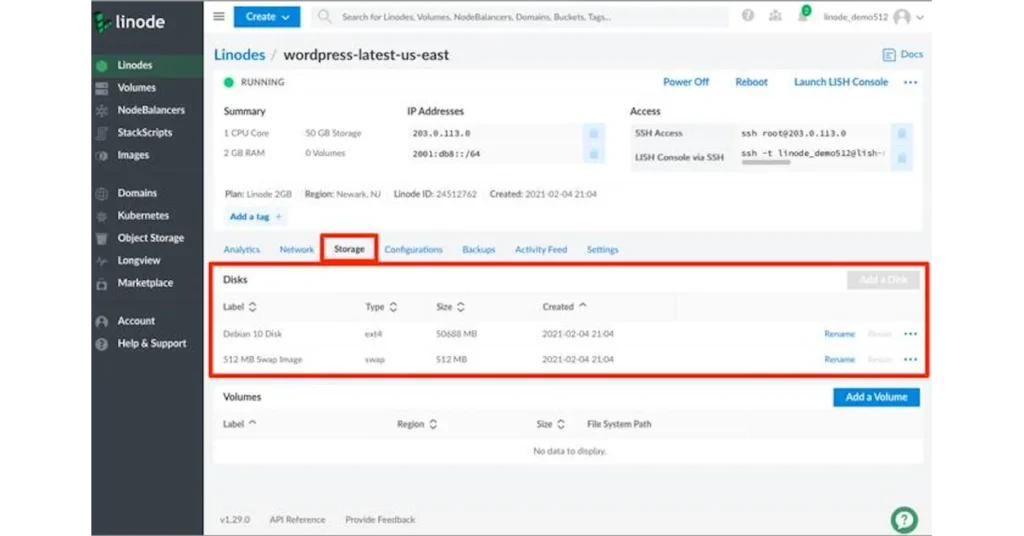
DigitalOcean User Interface:
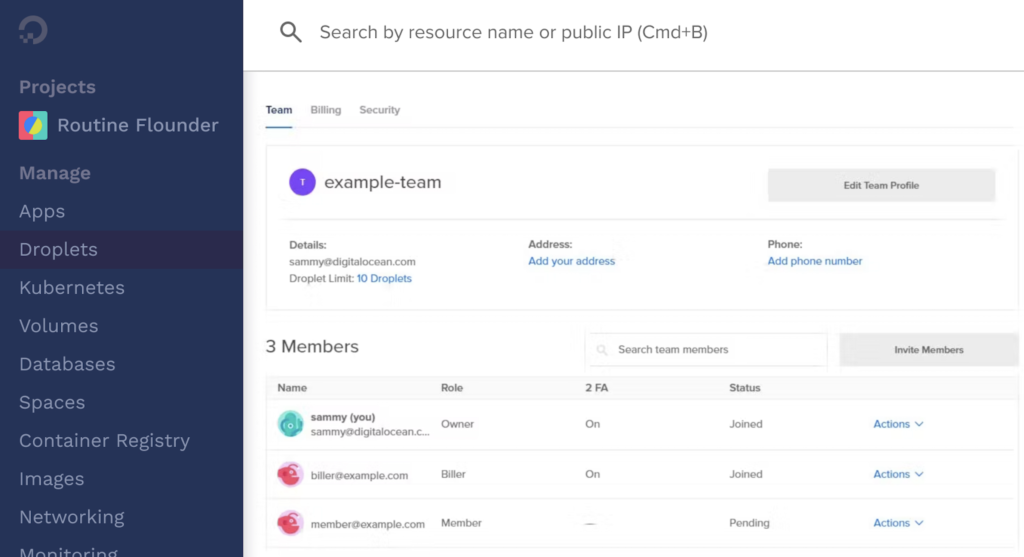
Ease of Use
In terms of ease of use, DigitalOcean and Linode provide a good user experience for their customers. DigitalOcean’s platform is known for its simplicity and ease of use, making it ideal for developers and small businesses looking for a straightforward cloud hosting solution.
With features like one-click application deployment, pre-configured droplets, and intuitive documentation, DigitalOcean makes it easy to get started and manage your cloud infrastructure effectively.
Similarly, Linode offers a user-friendly platform with intuitive tools and resources for deploying, managing, and scaling your cloud environment. Though, keep in mind that both platforms may be a little bit difficult to manage for beginners.
Best Performer: Although both platforms may be difficult to use if you are a beginner, DigitalOcean’s simple style and one-click application deployment may give it an advantage over Linode.
Features
Knowing what features cloud hosting companies like DigitalOcean and Linode offer is essential to make an informed decision. Both platforms offer a variety of tools and features to improve your hosting experience.
Load Balancers
DigitalOcean and Linode provide load balancing services as part of their offerings. These load balancers are responsible for distributing incoming traffic across multiple servers, ensuring that resources are utilized optimally and minimizing any potential downtime. DigitalOcean’s load balancers are seamlessly integrated into their platform, giving you an efficient traffic distribution to your applications. Linode offers NodeBalancers, a load balancing solution specifically designed to enhance performance and reliability for your infrastructure. These providers prioritize load balancing to improve the scalability and availability of your applications.
Block Storage
In terms of block storage, DigitalOcean and Linode offer scalable storage solutions to meet your storage needs. DigitalOcean’s Block Storage allows you to attach additional storage volumes to your droplets, providing flexible and reliable storage options for your data. Similarly, Linode offers Block Storage, enabling you to expand your storage capacity. Both providers prioritize scalability and reliability in their block storage offerings, allowing you to scale your storage infrastructure as your business grows.
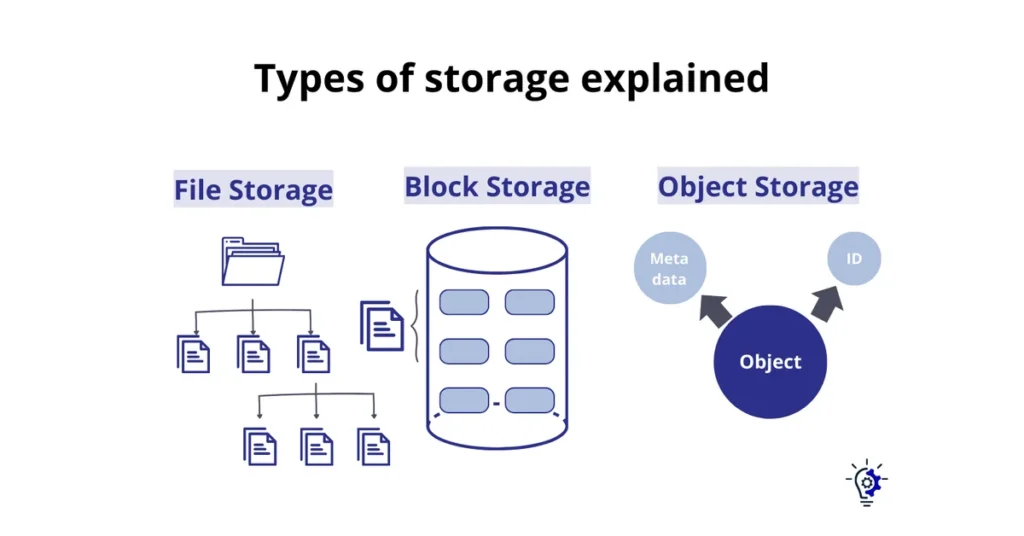
Kubernetes Integration
DigitalOcean and Linode both support Kubernetes integration, allowing you to deploy, manage, and scale containerized applications with ease. DigitalOcean’s Kubernetes Engine provides a managed Kubernetes service, simplifying the deployment and management of containerized workloads. Linode offers managed Kubernetes services, enabling you to leverage the power of Kubernetes for your applications.
Developer Tools
DigitalOcean provides a comprehensive set of developer tools, including APIs, CLI tools, and pre-configured development environments, to streamline the development process. Linode offers developer-friendly features like custom distro installations and professional services to enhance your development experience.
Best performer: While Linode provides competitive features such as block storage and Kubernetes integration, DigitalOcean’s comprehensive feature set, combined with its simplicity and affordability, often positions it as the preferred option for many users.
Customer Support
When it comes to customer support, DigitalOcean vs Linode offer various assets to assist you with your queries and concerns.
Linode Costumer Support:
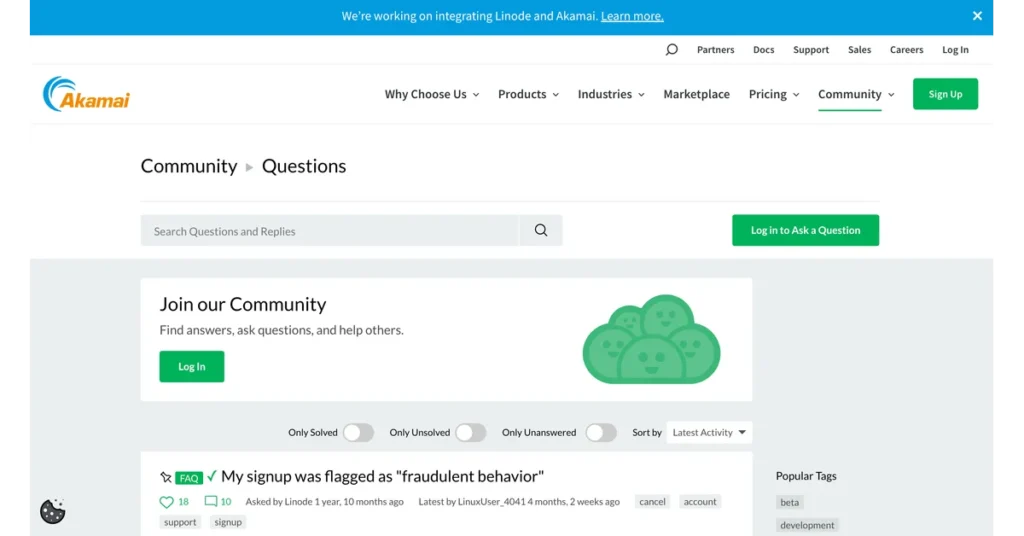
DigitalOcean Support Home:
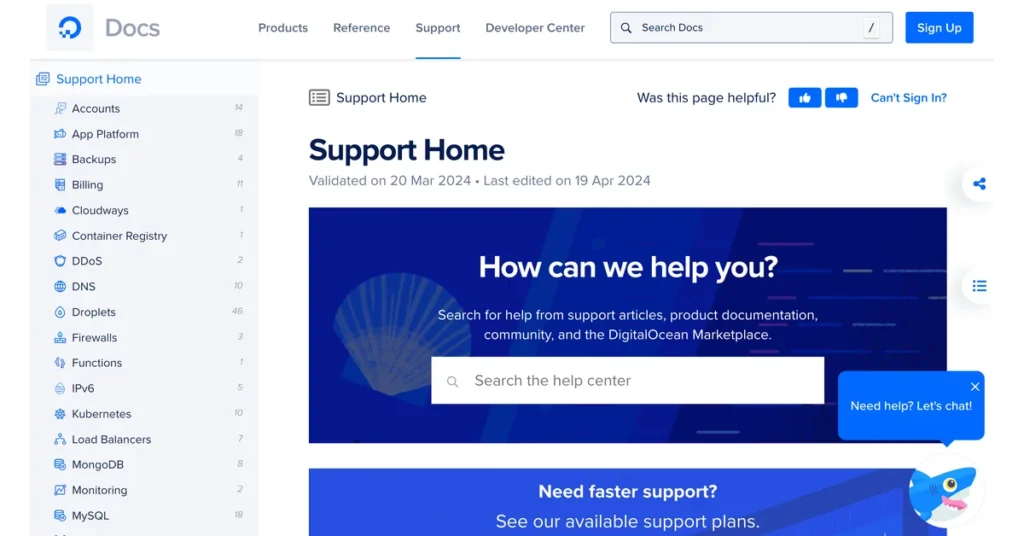
Documentation
DigitalOcean stands out for its comprehensive and well-organized documentation. It covers a wide range of topics, and their guides and tutorials are very detailed and easy to follow. DigitalOcean’s documentation provides valuable insights to help you navigate their platform efficiently.
While Linode also provides extensive documentation, I find it slightly less organized compared to DigitalOcean. However, Linode’s guides and tutorials are still informative and helpful, offering solutions to common issues and technical challenges you might have.
Community Forums
DigitalOcean and Linode have active community forums where users can seek assistance, share knowledge, and engage with other users. DigitalOcean’s community forum is particularly vibrant, with over 4 million developers worldwide contributing valuable insights and solutions.
Linode’s community forums provide a platform for users to ask questions, share experiences, and learn from each other. While Linode’s community may be slightly smaller in comparison, it still offers valuable support and resources for users.
Live Chat
DigitalOcean does not offer live chat support as part of its free options. While live chat support is not available, there are other services that could ensure timely responses to your inquiries.
In contrast, Linode offers live chat support operated by a bot. While the bot may have limitations in providing tailored support, it still offers a convenient way to get quick answers to your common questions.
Ticket-Based Support
DigitalOcean’s ticket-driven support service is highly commended for its quick and beneficial responses. You can submit tickets detailing your issues or concerns, and DigitalOcean’s support team typically responds in a relatively short time. The support agents have good knowledge and provide comprehensive assistance to resolve your queries effectively.
Linode’s ticket-based support connects you with real agents who can provide you with personalized assistance.
Best Performer: In terms of costumer support, Linode is one step ahead with its live chatbot.
Security
It is very important to prioritize the security of your data and applications when choosing a cloud hosting provider. To help you to make a well-informed decision, here we’ll analyze and compare the security features provided by DigitalOcean vs Linode. Check for services that use data encryption or data masking to protect your sensible information from spying eyes.
We also recommend you to check our guide on How To Protect Your Cloud Storage.
Firewall
DigitalOcean provides a robust free Cloud firewall service, offering customizable firewall rules to regulate traffic and prevent unauthorized access to your Cloud VPS.
Linode offers a customizable Cloud firewall service with its servers, allowing users to define rules to control inbound and outbound traffic. Although Linode’s firewall service is in Beta, it still provides essential security measures to protect your server.
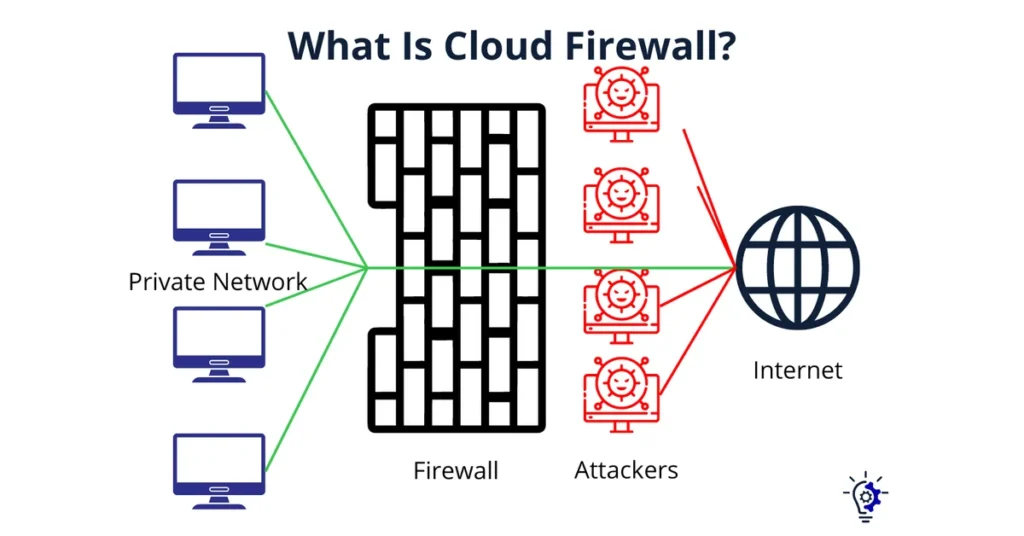
DDoS Protection
Linode includes free DDoS protection with all its servers, providing an added layer of defense against potential DDoS attacks and ensuring service availability during an attack.
On the other hand, DigitalOcean does not offer integrated DDoS protection as part of its standard services. Although DigitalOcean’s firewall service helps protect against certain threats, the absence of dedicated DDoS protection is certainly a disadvantage against DigitalOcean.
Backup Solutions
Both DigitalOcean and Linode prioritize data protection by offering regular backup solutions. DigitalOcean provides automated backups as an optional add-on feature, allowing you to schedule regular backups of your droplets and volumes for added data resilience.
Similarly, Linode offers backup solutions to protect data, which allows you to create and schedule backups of your servers and volumes. These backup features provide peace of mind by ensuring that your data is securely backed up and recoverable in case of any loss or corruption.
For your backups, you should use the 3-2-1 data storage backup rule.
Reliability
Reliability is a critical factor to consider when selecting a cloud hosting provider, as it determines the stability and availability of your services. Reliability in cloud hosting refers to the consistent availability of services, ensuring minimal downtime and uninterrupted access.

Uptime Guarantees
DigitalOcean offers a robust uptime guarantee, ensuring that your services remain accessible and operational with minimal disruption. They promise an impressive uptime percentage, providing you with confidence in the reliability of their infrastructure.
In comparison, Linode also offers an uptime guarantee, striving to maintain high availability for your services. While the specifics of their uptime guarantee may vary, they prioritize ensuring that your applications and data remain accessible to your users.
Service Level Agreements
DigitalOcean and Linode provide comprehensive service level agreements (SLAs) to outline their commitment to reliability and uptime. These SLAs define the level of service you can expect, including response times for support requests and compensation for any downtime experienced beyond their guaranteed uptime.
Downtime Incidents
While both providers strive to minimize downtime incidents, occasional disruptions may occur due to various factors such as maintenance, hardware failures, or network issues. DigitalOcean and Linode have robust incident response procedures in place to address any downtime incidents promptly and minimize their impact on your services.
Best Performer: DigitalOcean and Linode prioritize reliability and uptime to ensure the stability of your cloud hosting environment. However, DigitalOcean’s uptime guarantees and SLAs may offer slightly better reassurance in terms of reliability.
Networking
Networking plays a vital role in cloud hosting, determining how efficiently data is transferred and managed across servers. Networking in cloud storage infrastructure refers to the set of tools and services that enable efficient communication and data transfer between servers and users within a cloud hosting environment.

Private Networking
DigitalOcean offers private networking as a standard feature across its plans, enabling you to create a secure network for communication between your droplets. This enhances the performance and security of your applications by keeping internal traffic isolated from external networks.
Linode also provides private networking with its cloud hosting plans, allowing you to establish secure connections between your Linode instances. This feature improves data transfer speeds and facilitates collaboration between your servers while maintaining network isolation.
Load Balancing
Regarding load balancing, DigitalOcean offers a fully-managed load balancer service that distributes incoming traffic across multiple droplets to optimize performance and reliability. This ensures high availability and prevents any single server from becoming overwhelmed by traffic spikes.
On the other hand, Linode provides a NodeBalancer service, enabling you to configure load balancers for distributing traffic across multiple Linode instances. While not as fully managed as DigitalOcean’s solution, NodeBalancers offer flexibility and control over your load balancing configurations.
DNS Management
In terms of DNS management, DigitalOcean and Linode offer comprehensive DNS management interfaces, allowing you to manage your domain’s DNS records and configure settings such as A, AAAA, CNAME, and MX records. While both providers offer robust DNS management capabilities, DigitalOcean’s DNS interface may be slightly more user-friendly for beginners.
Best Performer: DigitalOcean fully-managed load balancer is one step ahead than Linode’s NodeBalancer service. But this depends on your personal preference.
Integrations
Integrations are very important to enhance the functionality and capabilities of cloud hosting platforms. They allow you to seamlessly connect your infrastructure with various tools and services to streamline development, deployment, and management processes.
CI/CD Tools
When we compare DigitalOcean vs Linode in terms of CI/CD tools, both platforms offer integrations with popular continuous integration and continuous deployment (CI/CD) tools like Jenkins, GitLab CI/CD, and CircleCI. These integrations enable developers to automate the testing, building, and deployment of their applications, enhancing productivity and reducing manual errors. DigitalOcean provides a more extensive selection of pre-configured CI/CD integrations through its marketplace, making it slightly more convenient for users to set up and manage their workflows.
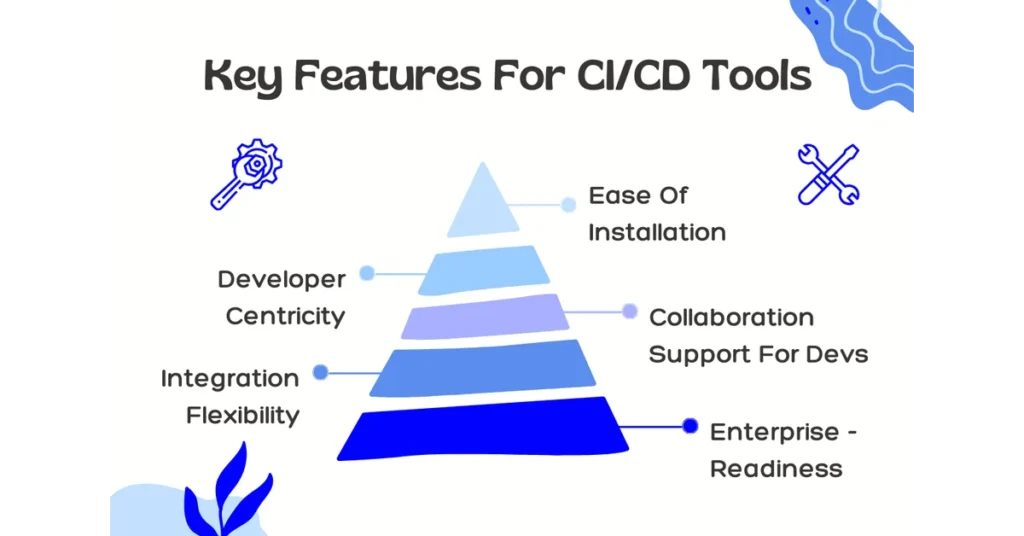
Monitoring Solutions
In terms of monitoring solutions, DigitalOcean and Linode offer integrations with leading monitoring tools such as New Relic, Prometheus, and Grafana. These integrations allow you to monitor the performance, availability, and health of your infrastructure and applications in real-time, helping you identify and address issues quickly.
DigitalOcean’s marketplace offers a broader range of monitoring solutions, including built-in integrations with its platform, giving you more flexibility and choice to monitor your space.
Cloud Marketplaces
DigitalOcean and Linode provide curated marketplaces where you can discover and deploy a wide range of pre-configured applications, services, and solutions. These marketplaces offer integrations with popular tools and technologies across various categories, including databases, development frameworks, content management systems, and more. But, as I said before, DigitalOcean’s marketplace has a larger ecosystem with a broader selection of offerings, making it the preferred choice for if you seek diverse integrations and solutions.
Best performer: DigitalOcean and Linode offer robust integrations with CI/CD tools, monitoring solutions, and cloud marketplaces, but DigitalOcean stands out as the better option if you are looking for a more extensive selection of pre-configured integrations and solutions to enhance your cloud hosting experience.
Developer-Friendly Features
Developer-friendly features are essential to create a conducive environment for software development and deployment on cloud hosting platforms. These features simplify development workflows, enhance productivity, and provide flexibility for developers to build and manage their applications effectively.
API Access
Linode and DigitalOcean offer robust API capabilities that allow developers to automate infrastructure management tasks, deploy resources programmatically, and integrate their cloud environments with third-party tools and services. However, DigitalOcean’s API documentation and developer resources are often considered more comprehensive and user-friendly, providing developers with clear guidance and examples for implementing API functionality in their applications.
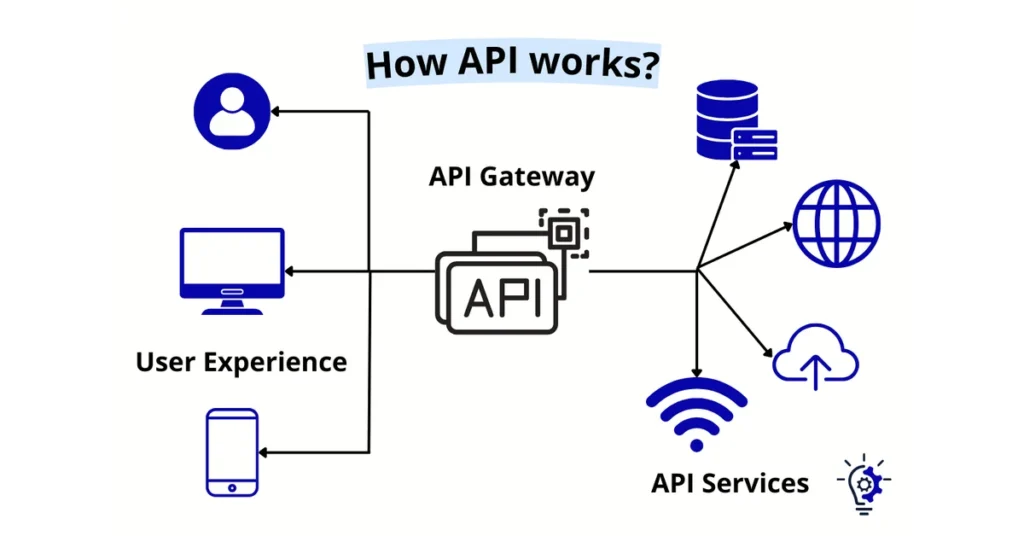
CLI Tools
Both of them provide command-line interfaces (CLIs) that enable developers to interact with their cloud environments directly from the terminal. These CLIs offer a wide range of commands for managing resources, deploying applications, and monitoring infrastructure performance.
Pre-configured Development Environments
When it comes to pre-configured development environments, DigitalOcean and Linode offer various solutions to simplify the setup and management of development environments. DigitalOcean’s Marketplace features a wide selection of pre-configured application stacks, development frameworks, and container images that developers can deploy with ease. Similarly, Linode offers a range of one-click applications and development stacks through its Cloud Manager interface, allowing developers to quickly spin up environments tailored to their needs.
Best Performer: Overall, DigitalOcean and Linode offer robust developer-friendly features, including API access, CLI tools, and pre-configured development environments. While DigitalOcean may have a slight edge in terms of API documentation and developer resources, both platforms provide comprehensive solutions for developers looking to build, deploy, and manage applications in the cloud.
Migration Support
When you are considering migrating from one cloud hosting provider to another, having the right tools and documentation is essential to ensure a smooth transition of your infrastructure and data.
Tools and Documentation
DigitalOcean and Linode offer robust tools and documentation to simplify migration processes. DigitalOcean provides detailed guides and tutorials covering various migration scenarios and offers pre-built images for quick deployment. Linode offers step-by-step guides and features like Linode Import to facilitate easy migration. Each platform prioritizes user-friendly tools and comprehensive documentation to streamline the migration process for their customers.
Best Performer: Overall, both DigitalOcean and Linode offer robust tools and documentation to support migration efforts, making it challenging to determine a clear winner. The choice between DigitalOcean and Linode for migration support depend on factors such as your familiarity with their respective platforms, the complexity of your migration needs, and your preferences for documentation style and user interface.
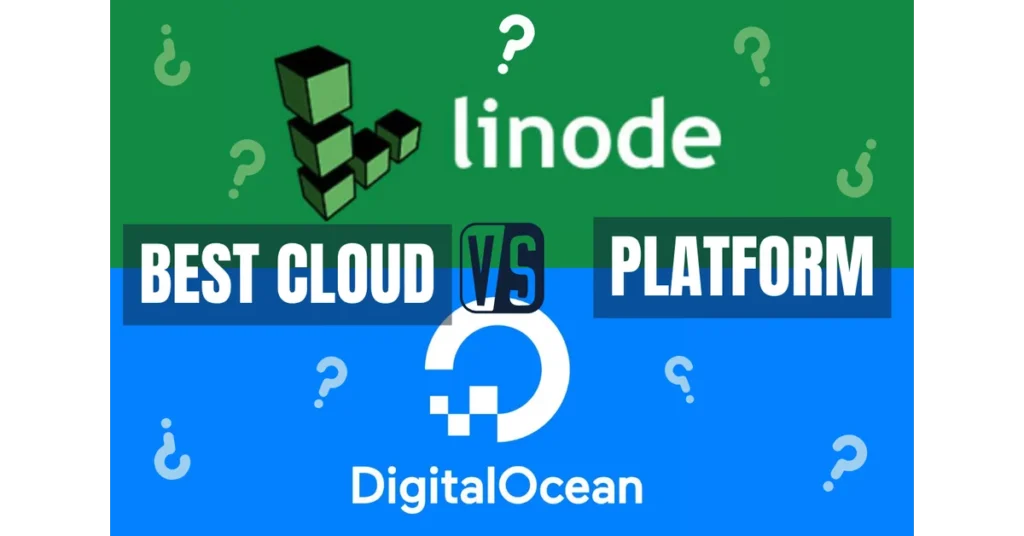
Relevant Articles
If you are interested in Cloud Storage Platform, I personally recommend you to check this blog post:
- What Is Snowflake Data Storage And How You Can Use It To Boost your Data Storage Strategy In 2024?
Conclusion – Which is the best DigitalOcean vs Linode?
To compare DigitalOcean vs Linode, it’s important to assess your individual requirements to determine which platform best aligns with your needs.
DigitalOcean has a very intuitive user interface and extensive documentation, making it an excellent choice for those prioritizing simplicity and straightforward deployment. With a focus on developer-friendly features and ease of use, DigitalOcean caters well to individuals and small to medium-sized businesses seeking a hassle-free cloud hosting solution.
On the other hand, Linode offers advanced networking capabilities, customizable instance types, and robust migration support, appealing to users who prioritize flexibility and scalability. If you value extensive networking options and a diverse range of instance types tailored to specific needs, Linode may be the ideal fit for your cloud hosting requirements. Ultimately, both DigitalOcean and Linode offer reliable services and responsive support, ensuring a seamless experience for your cloud hosting needs.
The decision between DigitalOcean vs Linode is in your hands. We recommend you to check the other posts to learn more about data storage. If you found this article useful, please share it with people that might be interested in Cloud Storage Platforms.


